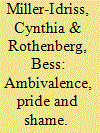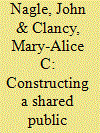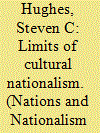|
|
|
Sort Order |
|
|
|
Items / Page
|
|
|
|
|
|
|
| Srl | Item |
| 1 |
ID:
111493


|
|
|
|
|
| Publication |
2012.
|
| Summary/Abstract |
This article examines complex everyday expressions and understandings of nationhood in Germany, focusing on citizens' articulations of national pride and their relationship with the nation. Through an analysis of ninety semi-structured interviews with 'ordinary' Germans conducted between 2000 and 2002, we argue that the prevailing, elite-centred approach to studying nationhood has not adequately captured the complex relationships that individuals have to the nation. We examine how individuals actively process and interpret nationhood in ways that reveal ambivalence, confusion and contradictory emotions towards the nation. Such individual variation is not neatly captured by official, elite, public or institutional presentations of the nation. We argue for further research on everyday understandings of nationhood and on ordinary people's views on national pride and national identity.
|
|
|
|
|
|
|
|
|
|
|
|
|
|
|
|
| 2 |
ID:
111491


|
|
|
|
|
| Publication |
2012.
|
| Summary/Abstract |
In order to bolster sustainable peace building in violently divided societies, a normative suggestion is that efforts should be made to construct a shared public identity that overarches ethnic divisions. A number of different centripetal/transformationist processes are identified as engineering a shared identity in comparison to consociational arrangements, which are accused of institutionalising ethnic differences and perpetuating conflict. These transformationist approaches essentially rest on the premise that because ethnicity is constructed it can be reconstructed into new, shared forms. Looking at Northern Ireland, we argue that there are limits to the extent that ethnicity can be reconstructed into shared identities. By analysing consociational and centripetalist/transformationist approaches to division, we conclude that although consociationalism will probably not deliver a common identity, it does provide a robust form of conflict regulation.
|
|
|
|
|
|
|
|
|
|
|
|
|
|
|
|
| 3 |
ID:
111488


|
|
|
|
|
| Publication |
2012.
|
| Summary/Abstract |
This article examines the ways in which young Canadians represent the 'the War on Terror' in their narratives. I explore how a hegemonic nationalist narrative enters into this representation in different ways and positions itself in a dynamic tension with the USA, at times eliding the difference and at times affirming it. I illustrate that these students do not simply tell the narrative of the war, but use the deixis of 'we/us/our' or 'them/they/their' in a way that constructs multiple imagined communities. I argue that these presumably benign representations of Canadian involvement in the war produce banal nationalism that excludes 'others', and binds human imagination into a framework that works against critical thinking.
|
|
|
|
|
|
|
|
|
|
|
|
|
|
|
|
| 4 |
ID:
111489


|
|
|
|
|
| Publication |
2012.
|
| Summary/Abstract |
This article brings the thought of Giuseppe Mazzini back into the field of nationalism studies, from which it has been largely missing for a half century. It suggests the following: that Mazzini is much more modern and secular than he is usually portrayed; and that his commitment to liberal policies while rejecting liberal principles suggests that the distinction between civic and ethnic nationalism has been misconceived. Nationalism, to Mazzini, was not an end in itself but a means to an end - government of, by and for the people. The demand for such a government was manifested in three popular demands in nineteenth-century Europe: in the West as democracy, in the East as national sovereignty (the precondition for democracy) and in both East and West as social democracy. Thus nationalism may be instrumental rather than an end in itself, and it may be attributable not to ethnic groups' natural striving for autonomy but to the pursuit of democracy.
|
|
|
|
|
|
|
|
|
|
|
|
|
|
|
|
| 5 |
ID:
111490


|
|
|
|
|
| Publication |
2012.
|
| Summary/Abstract |
This article critiques the 'cultural turn' in Italian Risorgimento historiography by examining Italian Switzerland, and specifically Ticino. This area paradoxically aided and abetted Italian patriots, especially Giuseppe Mazzini, yet rejected becoming part of the Italian national project. This paradox is heightened by the fact that the vast majority of the Italian nationalist literary canon, as identified by Alberto Maria Banti, was republished in Ticino. The paradox is explained in terms of the conflict between long-standing traditions of local autonomy and the idea of any form of uniform or centralised control, as originally represented by the Cisalpine Republic and then by both versions (Napoleonic and Piedmontese) of the Kingdom of Italy. However, I also use Banti's cultural concepts to demonstrate the creation of a powerful counter-myth of Italian Swiss nationalism in the character of William Tell.
|
|
|
|
|
|
|
|
|
|
|
|
|
|
|
|
| 6 |
ID:
111494


|
|
|
|
|
| Publication |
2012.
|
| Summary/Abstract |
Immigrant integration is currently a prominent issue in virtually all contemporary democracies, but countries in which the historic population itself is deeply divided - particularly those with substate nations and multiple political identities - present some interesting questions where integration is concerned. The existence of multiple and potentially competing political identities may complicate the integration process, particularly if the central government and the substate nation promote different conceptions of citizenship and different nation-building projects. What, then, are the implications of minority nationalism for immigrant integration? Are the added complexities a barrier to integration? Or do overlapping identities generate more points of contact between immigrants and their new home? This article addresses this question by probing immigrant and non-immigrant 'sense of belonging' in Canada, both inside and outside Quebec. Data come from Statistics Canada's Ethnic Diversity Study. Our results suggest that competing nation-building projects make the integration of newcomers more, rather than less, challenging.
|
|
|
|
|
|
|
|
|
|
|
|
|
|
|
|
| 7 |
ID:
111492


|
|
|
|
|
| Publication |
2012.
|
| Summary/Abstract |
This article presents a (critical realist) constructivist critique of both consociational and civil society/transformationist approaches and their crude understandings of politics and the prospects for political change. Consociationalism's primordialist or essentialist foundation leads it towards a world-weary, pessimistic, conservative realism about how far 'divided societies' may be transformed. Advocates of the civil society approach, in contrast, take an instrumentalist view of identity and are optimistic that a radical transformation can be achieved by mobilising the people against 'hard-line' political representatives. The constructivist approach can provide a framework in which a more complex and nuanced understanding of identities is possible. This better equips us for understanding the prospects of bringing about desirable political change. The first part of this article is a critique of Nagle and Clancy's consociationalism. The second part provides a brief outline of a constructivist critique of both the consociational and civil society understandings of politics and their contribution to understanding the politics of managing conflict.
|
|
|
|
|
|
|
|
|
|
|
|
|
|
|
|
| 8 |
ID:
111487


|
|
|
|
|
| Publication |
2012.
|
| Summary/Abstract |
Building on recent literature, this article discusses four ways of studying the relationship between religion and nationalism. The first is to treat religion and nationalism, along with ethnicity and race, as analogous phenomena. The second is to specify ways in which religion helps explain things about nationalism - its origin, its power or its distinctive character in particular cases. The third is to treat religion as part of nationalism, and to specify modes of interpenetration and intertwining. The fourth is to posit a distinctively religious form of nationalism. The article concludes by reconsidering the much-criticised understanding of nationalism as a distinctively secular phenomenon.
|
|
|
|
|
|
|
|
|
|
|
|
|
|
|
|
|
|
|
|
|